More vigorous 2025 in sight for M&A deals
At the 2024 M&A Forum organised by VIR in Ho Chi Minh City last week, KPMG Vietnam cited that deal value in the Asia-Pacific region witnessed a decrease of 5 per cent compared to the same period last year.
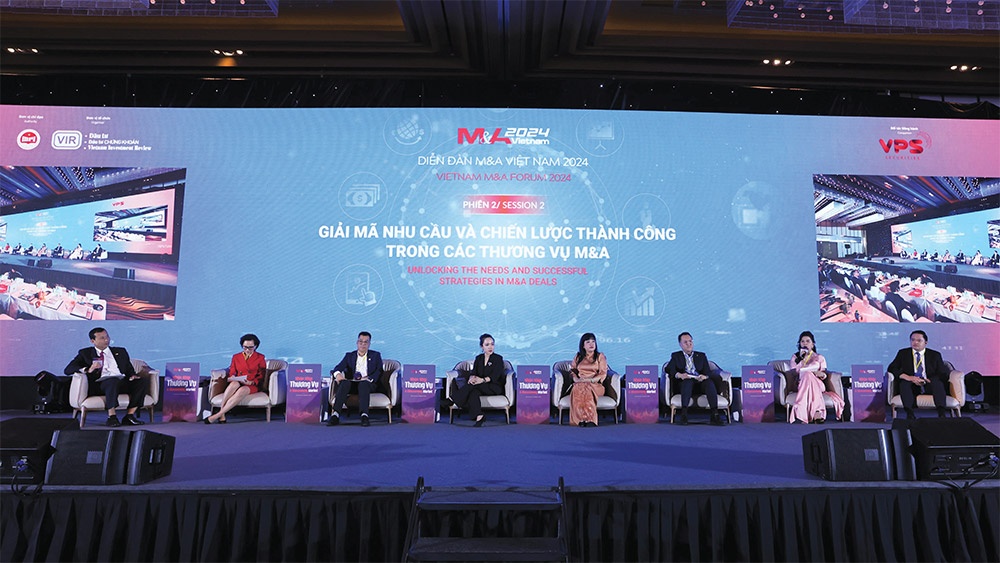 |
| M&A Forum organised by VIR in Ho Chi Minh City |
Specifically, the significant decrease in deal value in China (41 per cent) and Australia (7 per cent) over the same period has made a major mark in the regional market.
Notably, transaction volume and value in Southeast Asia are low, due to the influence of both global and regional challenges, leading to a cautious investment mentality.
However, in the opposite direction, Q1-Q3 recorded a significant improvement in transaction value in Vietnam, with a growth rate of 45.9 per cent over the same period.
The value growth is mainly driven by the low base of 2023 and a number of large transactions from domestic investors, suggesting that such businesses may be adjusting their business strategies as well as optimisation to focus more on their core business fields.
According to Dr. Nguyen Cong Ai, deputy general director of KPMG Vietnam, growth was driven by several transactions from Vingroup and Masan Group worth $1.9 billion, equivalent to 58 per cent of total market value. “In terms of structure, M&A transaction activities in the period mainly took place in real estate, essential consumption, and industry, accounting for 88 per cent of transaction value and in the top five largest deals,” said Ai.
Notably, the transaction with the highest value belongs a group of Vietnamese companies acquiring 55 per cent of the shares of SDI Trade and Investment Development Company, a subsidiary of Vingroup that indirectly owns 41.5 per cent stake in Vincom Retail. The value of the deal was recorded at $982 million.
The deal between Becamex IDC and CapitaLand Group on the transfer of a housing project worth more than $550 million in Binh Duong province to Sycamore Ltd. was the second notable deal in the real estate sector in 2024.
Experts said that positive policy changes in Vietnam in recent times have helped the market become more attractive. Vo Ha Duyen, chairperson of VILAF, acknowledged that the revision of investment attraction policies and the promotion of digital transformation by the government are seen as highlights.
“The most significant positive points are changes in the direction of reducing burdens and expanding opportunities, supporting investments in green technology and renewable energy, and aiming to encourage sustainable development,” Duyen said.
Specifically, the Digital Telecommunications Law, effective from July, has regulated a number of new services, including data centre, cloud computing, and basic telecommunications services on the internet to be in line with the trend of converting telecoms infrastructure into digital infrastructure and at the same time, creating a clear and equal legal environment for businesses, Duyen added.
Vietnam has been gradually loosening many foreign investor ownership limits and raising ownership to 100 per cent in many industries, such as electronics and videogame services, thereby helping non-nationals to more easily invest in such fields.
Vietnam also has an unprecedented mechanism to buy and sell electricity directly between investors and consuming businesses. Previously, consuming units had to buy directly from Vietnam Electricity.
Oh Hsiu-Hau, managing partner at Allen & Gledhill Vietnam, said at the M&A Forum that the promulgation of the Land Law this year is creating conditions for foreign investors to participate in Vietnam’s real estate market. “We have seen a lot of investor interest in real estate. But we also expect that, in addition to that, there will also be many projects in renewable energy, healthcare, and education,” Hsiu-Hau said.
In addition, clearer competition rules with more specific instructions, especially for transactions remitted from abroad, will also create confidence in attracting foreign capital.
Pham Minh Tuan, executive vice chairman of Bamboo Capital Group, said that with the correct policies, Vietnam can become a destination for renewable energy. “Investors also expect a number of new policies including a direct power purchase agreement mechanism, rooftop solar power development mechanism, and many more, which is opening opportunities for investors,” Tuan said.
Regarding policy, the government is also removing obstacles and encouraging domestic and international investors into this field. “The government also recognises that in order to create Vietnam’s position in the international market, it is necessary to ensure a strong mechanism to increase renewable energy electricity in the total supply, especially in the manufacturing and processing sectors that are attracting foreign investment,” Tuan added.
| Pham Minh Tuan, executive vice chairman Bamboo Capital Group
In recent years, the M&A market has been relatively subdued. The challenging economic environment has led foreign companies to scale back in 2023 and 2024 to preserve capital amid financial fluctuations. However, since the second half of 2024, shifts in macroeconomic policies and a series of positive developments such as economic recoveries in key countries, reduced interest rates, and growing optimism among domestic and international corporations have sparked expectations of a faster economic rebound. Consequently, businesses are exploring opportunities both domestically and internationally. Foreign investors are also optimistic about various policy changes, anticipating a revitalisation of the global economy. This makes Vietnam an increasingly attractive investment destination, with manufacturing expected to flow into the country over the next two years. This surge presents significant opportunities in M&A, drawing substantial attention from businesses. We are particularly optimistic about key policies in renewable energy and real estate, two of our core sectors, as they provide potential targets for our strategy in the coming years. The first criterion for a successful deal is alignment. Companies need to clearly identify their objectives and core strengths. For us, this means focusing on opportunities in renewable energy. We prioritise projects that have secured regulatory approval in this sector and, upon finding a suitable fit, proceed with M&A activities. The second criterion is economic efficiency. Every business must prioritise profitability. We have consistently excelled in this regard. Through rigorous due diligence, we pinpoint targets that align with our strategic goals. For instance, we recently completed an M&A deal involving the Tam Sinh Nghia waste-to-energy project. While this is a new area for us, it remains within our core business scope. Recognising the potential to develop Vietnam’s largest waste-to-energy plant, we seized the opportunity. For the past year, we have been acquiring companies, designing, and building new facilities as part of our ongoing operations. In addition, we also have several other targets in the renewable energy sector. Vo Ha Duyen, chairperson, VILAF
Some of the proposed changes reflect the trend of adopting global minimum taxes, and the indication would be that the new regime would reduce corporate income tax incentives on some investments. Additionally, the government is also looking to strengthen tax collection mechanisms, particularly for e-commerce platforms and online services. Other proposals that are also being made include revisiting the special consumption tax rates for a wide range of goods and services. These are now being drafted and being reviewed by all the relevant stakeholders and relevant state authorities, but these would probably require investors to carefully evaluate potential impacts on acquisitions, investments, and industries and sectors that might be impacted by the proposed legal regimes and tax incentives. Notably, a special investment procedure is proposed, fast-tracking to the local state authorities and requiring only 15 days for registration of a project. This procedure would allow exemption from all other investment and construction approvals. There would be no more in-principle investment approval, construction permits, environmental impact assessment appraisal, or fire-fighting safety licences for eligible projects. These projects are on the government priority list and are related to research and development, innovation centres, semiconductor and chip manufacturing, advanced battery tech, new materials, clean energy, and high-tech products. These proposed changes to the tax law, investment law, and construction law can have an impact on Vietnam’s M&A market, especially for larger transactions. Investors will probably take a bit longer time to evaluate and to consider what might be impactful before taking the next steps. Lee Leong Seng, head, Property Development/Residential, Real Estate (Vietnam) Keppel Ltd.
Currently, Keppel is implementing 25 projects in Vietnam with a total estimated investment value of $3.8 billion, including major developments like Saigon Centre, Celesta Rise, and Riviera Point. In the M&A sector, we have established effective collaborative partnerships with local partners. I anticipate that 2025 will mark a significant surge in activities, particularly new investment opportunities in the real estate sector. Adapting to global trends, Keppel is expanding its investment portfolio into diverse real estate segments, including residential properties, hotels, and emerging models like senior living facilities and data centres. We are connecting with global enterprises to track and capture market trends, while also noting that international funds are increasingly focusing on environmental and governance criteria. Vietnam, with robust economic growth and demographic dividend, is a promising destination for numerous international investment funds. This is an ideal moment for global companies to collaborate with local businesses and jointly create high-quality real estate products. I firmly believe that the combination of international investment capital and local enterprises’ market expertise will yield substantial success. Entering 2025, with new policies, we expect macroeconomic changes to be transformed into specific actions, contributing to the sustainable development of Vietnam’s real estate sector. In the coming years, as policies and regulations become more stringent, the market will witness the emergence of numerous new projects with high compliance standards. This will be a crucial factor, strongly supporting M&A activities. We are particularly enthusiastic about the positive changes in Vietnam’s investment environment. These improvements not only boost foreign investors’ confidence but also open up development opportunities for traditional and emerging industries. Nguyen Cong Ai, deputy general director KPMG Vietnam
In the current uncertain market conditions, investors are cautious, refraining from investing and not closing deals during this challenging market phase. I anticipate that in 2025, the global context will improve, and the Asian landscape will become more favourable for M&A transactions. Additionally, for the domestic market, we hope the economy will show signs of recovery, given that the government has made efforts to develop areas such as public investment, infrastructure investment, and particularly implemented policies to support real estate enterprises. Vietnam has recently demonstrated success in attracting foreign direct investment, and in the future, we will strive to attract more M&A investors, with promising developments anticipated in the market through increased participation from foreign investors. While I am not predicting a significant leap for 2025, I believe we can remain moderately optimistic. Some traditional sectors, such as finance and banking, are expected to surge next year, with enterprises potentially investing in domestic banks. Healthcare remains a sector of significant interest to foreign investors, while the real estate sector, having experienced a compression recently, might see market expansion in the coming period. Tamotsu Majima, senior director RECOF Corporation
Japanese businesses remain eager to engage. We have concentrated approximately 80-85 per cent of efforts on facilitating investment between Vietnam and Japan. Vietnam has successfully attracted substantial investment from Singaporean, South Korean, and Japanese investors, yet European companies remain sparse, with only a few American investors participating. Vietnam’s M&A environment still presents certain obstacles, with three key challenges being time, the accounting system, and overly high valuation expectations. Currently, the most difficult challenge is time. Deals between Japanese companies are typically completed within three months, while those between Japanese and European firms take six months. However, transactions between Japanese and Vietnamese businesses require up to 12 months to finalise. While hurdles remain, they can be overcome, and the opportunities remain highly promising. That said, the Japanese are known for their cautious approach. Therefore, we are committed to intensifying efforts to facilitate more deals between Vietnamese and Japanese enterprises. Dang Thi Kim Oanh, chairwoman and CEO Kim Oanh Group
We are advancing our vision through strategic partnerships with Japanese corporations, embracing their stringent demands as opportunities for growth. With over 20 years of experience in real estate development, this has marked a pivotal year as we begin to collaborate with four Japanese firms renowned for their professionalism, transparency, and disciplined approach. These partnerships, set to materialise over two years, involve meticulous standards and unprecedented conditions in Vietnam’s M&A landscape. Japanese investors prioritise prime locations, clear legal frameworks, and a ‘pay-as-progress’ financial model tied to strict milestones. We are nearing the completion of legal requirements to finalise these collaborations. Beyond these ventures, we are driving projects across diverse segments, including affordable, mid-range, and high-end housing. In the affordable housing sector, a two-phase plan from now to 2028 is set to deliver 40,000 units through 26 projects, requiring a $1.24 billion investment. The first phase, running through 2026, will introduce 25,000 units across 14 projects. Luu Thi Thanh Mau, CEO, Phuc Khang Corporation
Working with foreign investors requires a long-term, sustainable approach, and this is a smart choice for any business. Around six or seven years ago, Phuc Khang Corporation began its partnership with Japan’s Mitsubishi Corporation, successfully developing the Diamond Lotus project, which features 800 internationally certified green apartments. This partnership, rooted in shared values of safety and sustainability, gave birth to Phuc Khang’s first green real estate project after five years of collaboration. Working with Japanese investors, renowned for their stringent standards, has been challenging but rewarding, fostering our significant growth. The success of such partnerships hinges on addressing key challenges and managing critical factors. First, businesses must avoid complacency; possessing prime land and local advantages is insufficient without meeting foreign investors’ requirements. Many deals fail due to unpreparedness. Second, companies must define goals beyond financial gain. A skilled, internationally adaptable workforce is also essential, as cultural diversity demands a commitment to learning at all levels. There are three areas to manage. Firstly, firms must prepare thoroughly, ensuring transparency, discipline, and a clear focus on long-term benefits. Secondly, adapting to change is critical. For instance, during our first collaboration with Mitsubishi - a partnership between a nine-year-old company and a 130-year-old one, we worked through holidays to meet their rigorous standards. Finally, businesses must actively seek resources and leverage foreign partnerships to accelerate development. Pham Duy Khuong, managing partner, ASL Law
For a successful M&A deal, it is crucial to understand the preferences of investors and conduct meticulous due diligence on the target business. When engaging with investors, the ability to decode their preferences plays a vital role. However, investor appetites are now more diverse than ever. While Japanese, South Korean, and Chinese investors have traditionally been key players, Indian investors have emerged as notable newcomers, each with distinct interests. For instance, Chinese investors tend to favour industrial real estate, aiming to capitalise on the relocation of manufacturers to Vietnam. In contrast, Japanese investors focus on companies capable of supplying global chains, often leaning towards IT firms. One trending sector attracting investor attention is e-commerce. In recent years, several cross-border e-commerce platforms have entered the Vietnamese market. These players typically prepare in advance by targeting logistics firms for M&A, especially those with warehouses and cold storage facilities. Key sectors prioritised by investors in Vietnam include industrial real estate, IT, factories, warehouses, and ports. Recently, foreign investors have shown significant interest in acquiring Vietnamese ports. However, these transactions often require extended periods for legal due diligence. Angus Liew, chairman, Gamuda Land Vietnam
All M&A transactions are valuable lessons. Gamuda Land has participated in six acquisition and six divestment deals, thereby distilling many important experiences. To successfully execute M&As, I believe three key factors are essential. The first key aspect is the ability to anticipate unpredictable elements. This makes a contingency plan essential for mitigating unexpected risks. By carefully anticipating and preparing for such situations, businesses can minimise the impact of undesirable outcomes. Equally important is the selection of a reputable advisory firm, which plays a pivotal role in the success of transactions. A competent and experienced consulting company can streamline the process and navigate complex regulations more effectively. Conversely, poor choices in consultants may jeopardise the entire transaction. Lastly, flexibility and patience are crucial, as the journey through M&A is rarely straightforward. To achieve success, parties must have agility and support each other throughout the process. Time may be lengthy, but patience is key. To move quickly, one must proceed slowly. Nguyen Tran Thuc Anh, investment director, Covestcons
This year we welcomed two esteemed companies into the Covestcons family. Both have a long-standing presence in Vietnam, specialising in construction, manufacturing, and equipment installation. These partnerships represent strategic milestones in our M&A journey. Our strategy transcends traditional notions of acquisition. Instead of focusing on dominance or control, we embrace the philosophy of “keep the fire burning”. This principle reflects our commitment to fostering sustained momentum and establishing a foundation for long-term growth and collaboration. Green factors have become a defining priority in the investment landscape, marking a pivotal shift in recent years. Sustainability has evolved from a trend into an imperative over the past three years, influencing business strategies and decision-making at every level. When assessing investment opportunities, our evaluation focuses on two primary criteria. First, the deal must enhance the diversity of products and services for our clients. Second, it must create meaningful value for our partners and society. By collaborating with social enterprises and partners, we strive to elevate industry standards, particularly in construction. This is the hallmark of a successful deal. While the M&A sector has faced its share of fluctuations in recent years, 2024 marks a period of recovery. Looking ahead, the field is expected to rebound strongly. Seck Yee Chung, partner, Baker McKenzie
There is a positive outlook and optimism for M&As in Vietnam. However, we all have to be realistic, as it is a mixed landscape. Certainly, there are many things to be excited and encouraged about, for example, how Vietnam’s leadership has managed geopolitics. Confidence is building for innovation, and Vietnam wants to move up the value chain in manufacturing. Of course, its population, comprising young people, increasingly skilled workers, and the rising middle class, demand a wide variety of goods and services. However, we know that many challenges lie ahead. I think between the US and China, no matter who would have won the US presidency this year, our sense is that it’s not going to make a big difference in the trade relationship between the US and China. We don’t think it’s going to improve soon. Western nations would continue to prefer to see products that were made outside of China. And of course, we have seen supply chains moving towards Southeast Asia, including Vietnam. This trend will certainly continue under the incoming administration of the US. Oh Hsiu-Hau, managing partner Allen & Gledhill Vietnam
Vietnam’s M&A market is expected to maintain its dynamism, particularly in real estate and healthcare. The real estate sector as a whole is benefitting from recent amendments to the Law on Real Estate Business. These changes have paved the way for foreign investors to engage in Vietnam’s property market through M&A. While real estate continues to draw significant attention from investors, there is growing anticipation that other sectors, such as renewable energy and healthcare, will entice similar interest. Recent years have seen numerous transactions in healthcare and medical services, and expectations remain high for further deals in this sector. Changes in policies and regulations within the healthcare sector, along with the establishment of a clearer legal framework, are expected to create opportunities for attracting foreign investment and enhancing Vietnam’s M&A profile. However, legal procedures in Vietnam remain a significant obstacle. Prolonged processes, often lasting from nine months to a year, and uncertainty around obtaining approvals have discouraged some investors. Addressing these hurdles could significantly expedite transactions and boost investor confidence. In response, the government in Vietnam has accelerated efforts to digitalise administrative procedures, aiming to streamline processes and shorten timelines for transactions. This move is expected to facilitate foreign capital inflows and further invigorate Vietnam’s M&A market. Binh Le Vandekerckove, CEO & Head of M&A ASART Deal Advisory
The M&A landscape has evolved, with a growing focus on themes like AI and clean agriculture, rather than traditional industry-based investments such as healthcare, education, retail, and logistics. Over the past 3-5 years, investors have shifted their priorities towards these thematic opportunities. For instance, in 2022, ASART facilitated a major deal where CVC Capital acquired Phuong Chau International Hospital for $116 million. This momentum continued into 2023, with over 10 healthcare deals valued at billions of US dollars. Education also attracts considerable attention, though Vietnam lacks scalable target companies with the potential to draw significant investments. Meanwhile, logistics presents substantial interest but remains a challenging sector for M&As due to its complexities and unique characteristics, requiring extensive due diligence before deals are completed. With Vietnam’s M&A market expected to bloom in 2025, advisory firms are set to play a pivotal role, acting as strategic connectors between buyers and sellers. For transactions exceeding $10 million, particularly those over $30 million, advisors are indispensable in aligning the strategic goals of both parties and facilitating partnerships with long-term potential. Notably, buyers often demand that target companies engage advisors to ensure professionalism. This avoids scenarios where buyers must dictate the rules of the game to the sellers, underscoring the critical role of skilled M&A consultants in driving successful outcomes. |
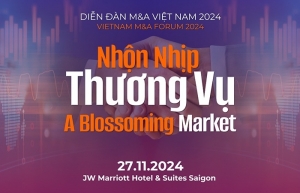 | The 16th Vietnam M&A Forum: A Blossoming Market After a period of stagnation, Vietnam’s M&A market is now on a strong recovery trajectory, with major deals starting to re-emerge. |
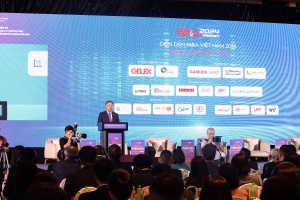 | Vietnam M&A Forum 2024 reveals new opportunities The 2024 Vietnam M&A Forum, themed 'A Blossoming Market', is taking place at JW Marriott Hotel & Suites Saigon in Ho Chi Minh City on November 27. |
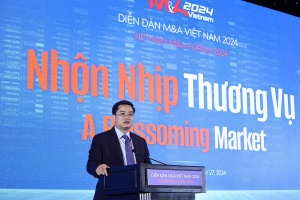 | Vietnam’s M&A market expected to rebound next year As Vietnam sets a high target for economic growth in 2024, mergers and acquisitions are projected to rebound on the back of growing foreign interest. |
 | Vietnam’s M&A market set for 2025 surge amid regulatory reforms and foreign investment Speaking on the sidelines of the 16th M&A Vietnam Forum 2024 at the JW Marriott Saigon on November 27, Oh Hsiu-Hau, managing partner at Allen & Gledhill (Vietnam), shared his insights with VIR's Ngoc Huong on the outlook for the M&A market. |
What the stars mean:
★ Poor ★ ★ Promising ★★★ Good ★★★★ Very good ★★★★★ Exceptional
Related Contents
Latest News
More News
- New rules ease foreign access to Vietnam equities (February 05, 2026 | 17:29)
- Vietnam’s IFC creates bigger stage for M&As (February 01, 2026 | 08:16)
- Game startup Panthera raises $1.5 million in seed funding (January 29, 2026 | 15:13)
- Cool Japan Fund transfers shares of CLK Cold Storage (January 28, 2026 | 17:16)
- Nissha acquires majority stake in Vietnam medical device maker (January 26, 2026 | 15:40)
- BJC to spend $723 million acquiring MM Mega Market Vietnam (January 22, 2026 | 20:29)
- NamiTech raises $4 million in funding (January 20, 2026 | 16:33)
- Livzon subsidiary seeks control of Imexpharm (January 17, 2026 | 15:54)
- Consumer deals drive Vietnam’s M&A rebound in December (January 16, 2026 | 16:08)
- Southeast Asia tech funding rebounds on late-stage deals (January 08, 2026 | 10:35)




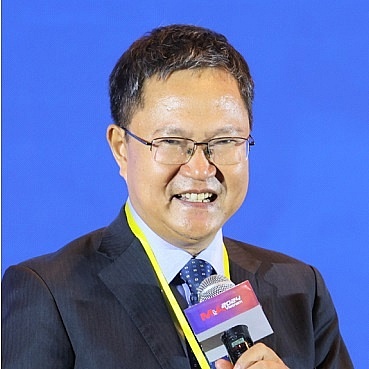









 Tag:
Tag:


















 Mobile Version
Mobile Version